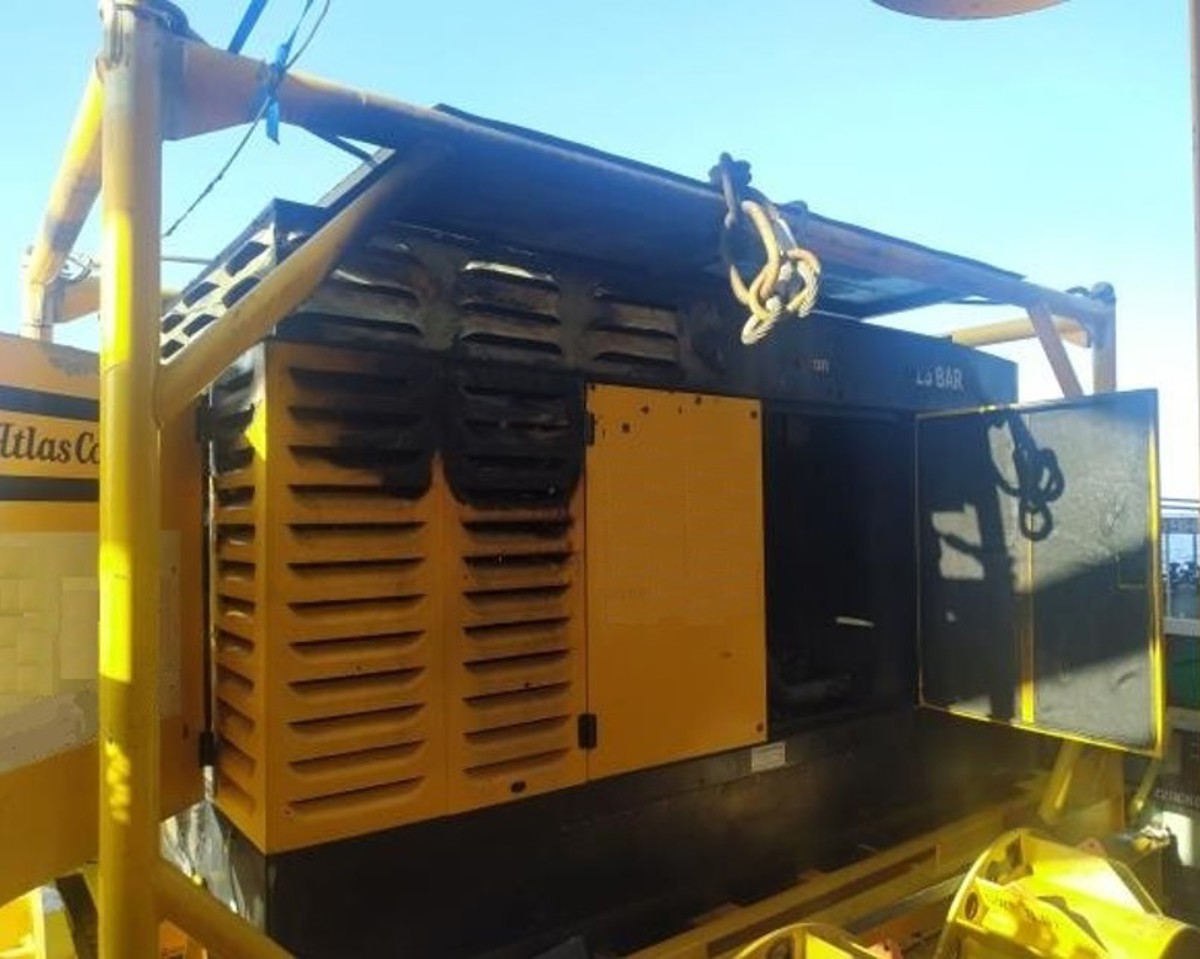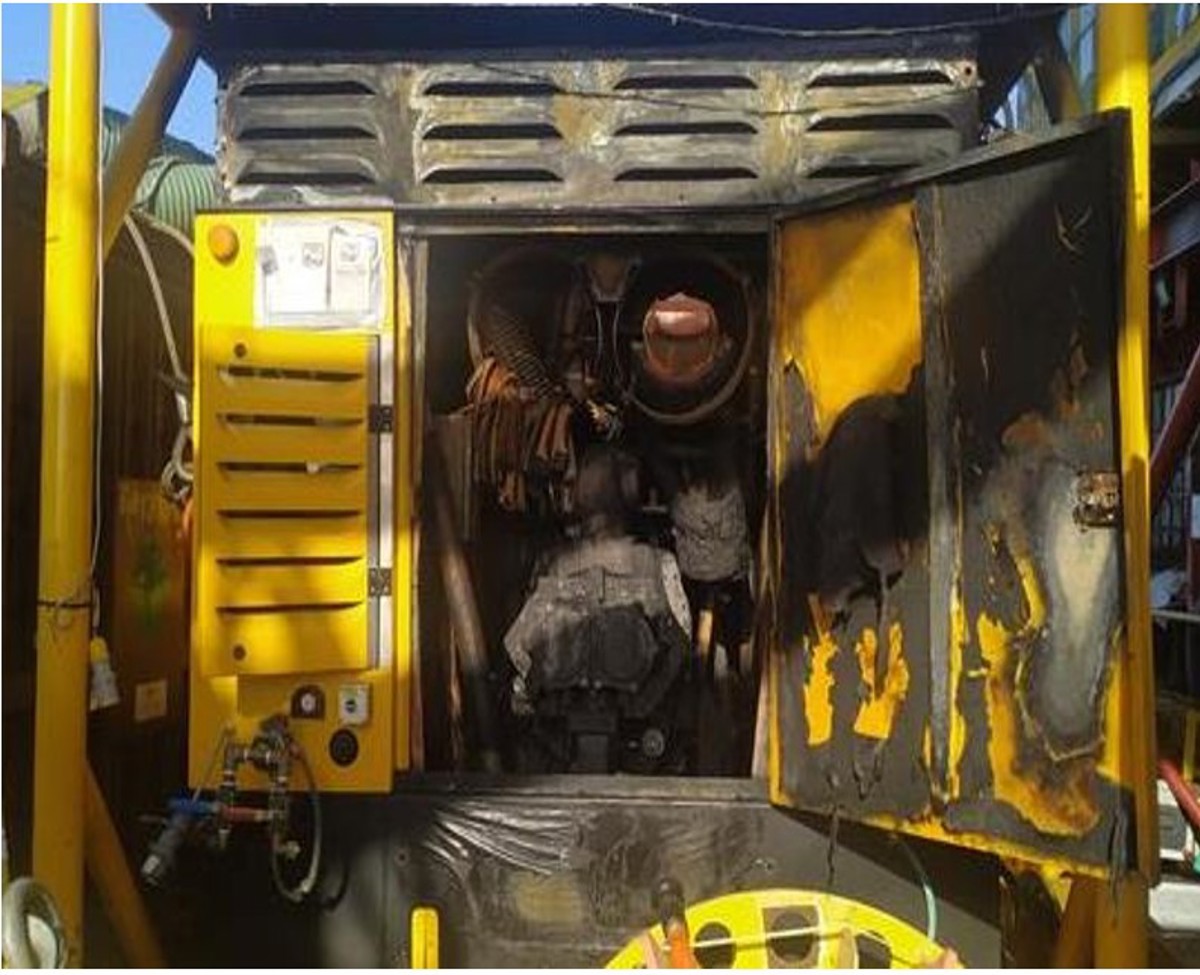Compressor fire
- Safety Flash
- Published on 27 February 2023
- Generated on 28 February 2026
- IMCA SF 06/23
- 2 minute read
Jump to:
There was a fire in a 25bar high flow diesel driven screw compressor installed on the back deck.
What happened?
The incident occurred on a diving support vessel operating within the 500m zone of a platform.
The compressor was a long-term rental unit being used to provide ancillary air for subsea operations.
It had had been running for 30 minutes at the time of the fire, and there were no indications of anomalies leading up to the incident.
The fire was extinguished quickly and safely. There were no injuries.

Compressor on deck
What went wrong?
- There was a short circuit within the compressor electrical junction box, which melted insulation on cables both inside and outside the junction box.
- The radiant heat from the melted wires compromised the integrity of a nearby oil scavenger line.
- The scavenger line end fitting parted, which released compressor oil under pressure inside the compressor cabinet. This oil ignited, causing a fire which was fed by air being drawn across the compressor by the engine cooling fan.

Damage to interior of the compressor
Causal factors
- The Original equipment manufacturer (OEM) maintenance regime did not require the physical testing (i.e. insulation resistance checks) of wiring at each major service interval.
- The hired compressor was considered “standard equipment” within the company and did not require detailed pre-mobilisation inspection/surveillance activity.
- The risk assessment and management of change for the use of the compressor did not identify fire as a hazard associated with operating the equipment, and a safe use of work equipment assessment had not been completed.
Actions taken
- When procuring temporary equipment to be used in the offshore environment:
- Assess the potential fire hazard, and if applicable check the unit for in-built fire suppression capability and audible/visual alarm system set-up.
- Temporary equipment used in the offshore environment should be considered as non-standard, and procurement of such equipment should be subject to careful and appropriate checks.
- Assess the potential fire hazard, and if applicable check the unit for in-built fire suppression capability and audible/visual alarm system set-up.
- Before mobilising mobile deck equipment onto vessels, consider the required inspection/surveillance necessary, inclusive of any run-up test and review of maintenance and operational history.
- Once temporary mobile deck equipment is mobilised, ensure that a safe use of work equipment assessment is completed.
- Deck plans should reflect the safe positioning of equipment and consider requirements for exclusion zones around adjacent equipment in event of fire.
Our Member noted that this was the fourth compressor fire incident across their offshore operations since 2018.
Related safety flashes
-
IMCA SF 10/19
13 May 2019
-
-
IMCA SF 19/14
18 December 2014
-
IMCA SF 09/13
18 June 2013
IMCA Safety Flashes summarise key safety matters and incidents, allowing lessons to be more easily learnt for the benefit of the entire offshore industry.
The effectiveness of the IMCA Safety Flash system depends on the industry sharing information and so avoiding repeat incidents. Incidents are classified according to IOGP's Life Saving Rules.
All information is anonymised or sanitised, as appropriate, and warnings for graphic content included where possible.
IMCA makes every effort to ensure both the accuracy and reliability of the information shared, but is not be liable for any guidance and/or recommendation and/or statement herein contained.
The information contained in this document does not fulfil or replace any individual's or Member's legal, regulatory or other duties or obligations in respect of their operations. Individuals and Members remain solely responsible for the safe, lawful and proper conduct of their operations.
Share your safety incidents with IMCA online. Sign-up to receive Safety Flashes straight to your email.